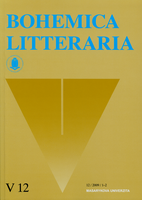Ke čtyřem barokním kázáním se svatební tematikou
Four Baroque Wedding Sermons by Three Preachers
Author(s): Jitka RejhonováSubject(s): Cultural history, Czech Literature, 18th Century, Pastoral Theology, Hermeneutics
Published by: Masarykova univerzita nakladatelství
Keywords: Baroque; preaching; wedding theme; topos;
Summary/Abstract: This study deals with four sermons with wedding theme written by three Baroque preachers: Daniel Nitsch (one sermon), Bohumír Hynek Bilovský (two sermons) and Damascen Marek (one sermon). All these sermons were written between the turn of 18th century and the year 1725. In particular, this study focuses on topoi which appear in these sermons. The term “topos” is defined on the basis of Curtius’s conception but it is modified on the basis of our subject of study. The study is devoted to the individual preachers and their sermons. The first topos, “wine”, is a topos on the thematic level, which is connected with the meaning “conjugal love”. This metaphor is derived from the New Testament story about the marriage in Cana Galileae (St John’s Gospel). The story opens four sermons by all three preachers (Nitsch, Bilovský and Marek). Another important topos called “honesty and dishonesty in married life” is an extensive topos, which appears in every sermon; it is the main topic of Marek’s sermon and of two sermons by Bilovský. It comprises other topoi such as “keeping the purity”, “bad woman” and “bad man”, which also appear in every sermon. Another topos is called “two are one” and is also connected with the Bible. It appears in Nitsch’s sermon and in the first sermon by Bilovský. There is also one more topos called “equality between a husband and a wife”, which was found in the second sermon by Bilovský and in the one written by Marek. Each preacher worked with these topoi in his own way therefore there are both similarities and differences between the sermons. Nitsch’s sermon refers to married life in general while Bilovský and Marek focus on the negatives. This fact can be caused by developments in preaching as such. While Nitsch is one of representatives of the earlier generation characterized by traditional (humanism) course, Bilovský is a supreme represetative of the conceptual trend. It is not known whether the sermons were prepared for a specific wedding ceremony or whether they were just prepared for a usual Sunday service but according to the general characteristics of the texts I hold the opinion that it was used in Sunday services. Only Marek’s sermon contains more remarkable evidence that it could have been prepared for a wedding ceremony and subsequently included into his postil.
Journal: Bohemica litteraria
- Issue Year: 12/2009
- Issue No: 1-2
- Page Range: 33-53
- Page Count: 21
- Language: Czech

